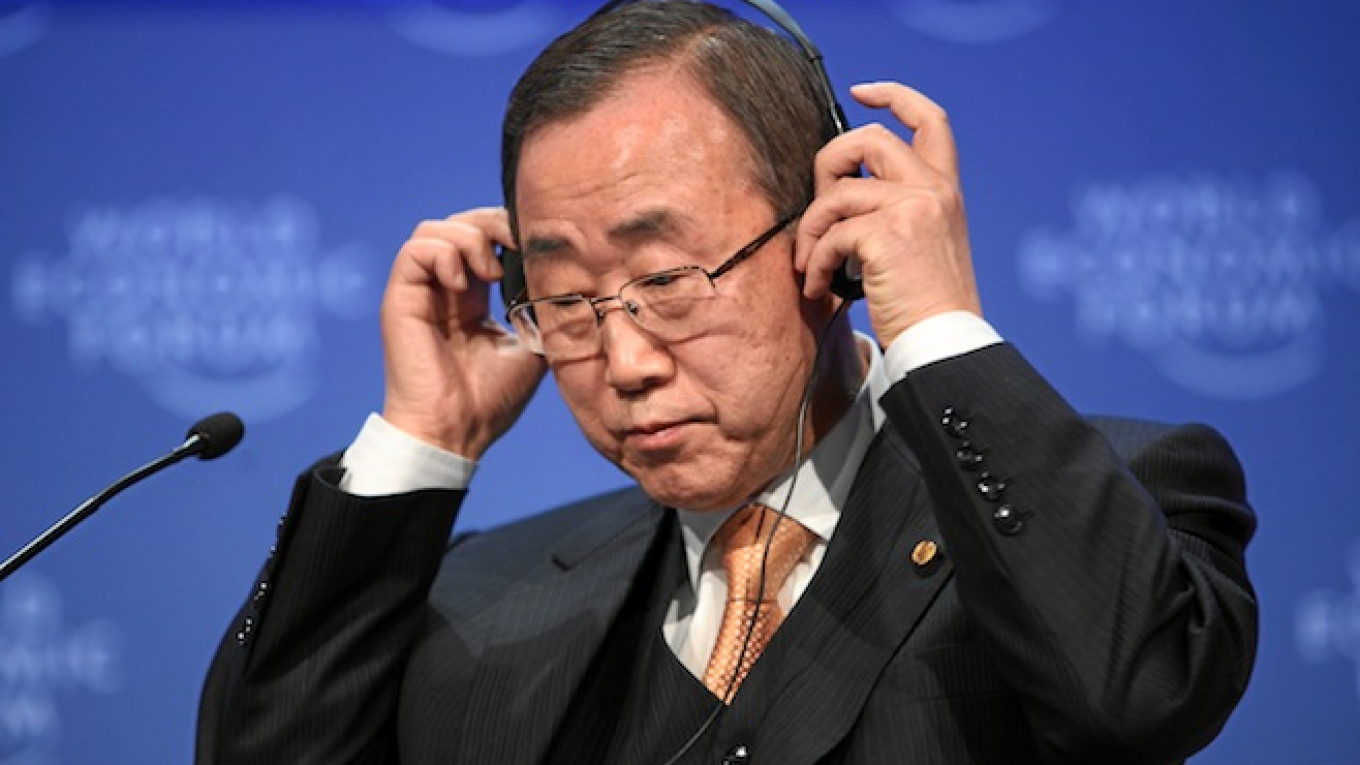UN Secretary-General Ban Ki-moon said Tuesday the partial cease-fire brokered by Russia and the United States for Syria was largely holding, despite occasional outbreaks, and urged all parties to “keep their promises” and allow humanitarian aid deliveries to besieged areas.
Following the cessation of hostilities, which came into effect on Feb. 27, the Syrian government and opposition rebels are scheduled to resume peace talks on March 9, the UN special envoy for Syria, Staffan de Mistura, said in a statement Tuesday.
A previous round of talks collapsed in February. The new round was initially planned for March 7, but was pushed back for “logistical and practical” reasons, de Mistura's office said in a statement.
UN officials hope to use the lull provided by the partial cease-fire to resume airdrops of food aid to besieged areas, Ban said Tuesday during a visit to Madrid.
“So far the cessation of hostilities is by and large holding, despite some incidents,” he said. “I call on all parties to continue to keep their promises and demonstrate their good faith, particularly to allow the delivery of vital humanitarian aid to besieged areas.”
Nearly half a million people live in those areas, Ban said. Some have not received aid “for months or even years,” and many “may have starved to death or died from a lack of routine healthcare,” he said.
The UN acknowledged last week that much of its previous airdrop of 21 tons of food aid — dispatched before the truce came into effect — was damaged, drifted away or fell into minefields. But larger airdrops, expected to feed at least 140,000 people, are expected within the next six days, Ban said.
“We will continue to try to provide other air drops,” he said. “That is our top priority. For that to be possible, it is crucially important for the cessation of hostilities to be kept, without being broken.”
Russian Foreign Minister Sergei Lavrov said Tuesday that both Moscow and Washington believe the truce is “moving in the right direction,” despite some incidents.
“There are separate violations, but neither our main colleagues, nor other partners are inclined to dramatize,” Lavrov said.
“We are content with the progress on the humanitarian front regarding the unblocking of yet more residential areas, the supply of cargo — food, medications — to people in need,” he said.
Ban met with Lavrov on Tuesday and “thanked him for his significant role in achieving recent progress on Syria,” the UN Secretary-General's office said in a statement.
Ban and Lavrov “agreed on the importance of urgently moving forward simultaneously on implementing the cessation of hostilities agreement, providing vital humanitarian assistance to civilians, and returning to political negotiations,” the statement said.
Russia has been bombing rebel-controlled territories in Syria since Sept. 30, suspending the air campaign for a day to mark the beginning of the truce, but then resuming the attacks. Moscow insists the raids target only terrorist groups.
U.S. Secretary of State John Kerry said on Monday that Washington was working together with Moscow to ensure that any air strikes in Syria are aimed at recognized terrorist groups.
“I’ve had a couple of conversations with Foreign Minister Lavrov, and we have agreed that while there have been some number of violations reported on both sides and we take them all very seriously, we do not want to litigate these in a public fashion in the press,” Kerry said.
“We are going to track down each alleged violation and work even more now to put in place a construct which will help us to be able to guarantee that missions are indeed missions against Nusra or missions against Daesh, one of the two,” Kerry said. He used a derogatory Arabic moniker, Daesh, to refer to the Islamic State terrorist group.
The partial cease-fire involves the government of Syrian President Bashar Assad — who has Russia's backing — and opposition rebels, many of whom are supported by the United States and its European allies. The truce excludes recognized terrorist groups, such as the Islamic State and al-Qaeda affiliate Nusra Front.
During the preceding months of intensive Russian air strikes, Western officials and analysts accused Moscow of using the bombings to target Assad's political opponents and prop up his regime. Syrian government forces have retaken control of substantial areas, pushing back rebel groups, since the start of Russia's air strikes.
Islamic State is a terrorist group banned in Russia.
Contact the author at newsreporter@imedia.ru
A Message from The Moscow Times:
Dear readers,
We are facing unprecedented challenges. Russia's Prosecutor General's Office has designated The Moscow Times as an "undesirable" organization, criminalizing our work and putting our staff at risk of prosecution. This follows our earlier unjust labeling as a "foreign agent."
These actions are direct attempts to silence independent journalism in Russia. The authorities claim our work "discredits the decisions of the Russian leadership." We see things differently: we strive to provide accurate, unbiased reporting on Russia.
We, the journalists of The Moscow Times, refuse to be silenced. But to continue our work, we need your help.
Your support, no matter how small, makes a world of difference. If you can, please support us monthly starting from just $2. It's quick to set up, and every contribution makes a significant impact.
By supporting The Moscow Times, you're defending open, independent journalism in the face of repression. Thank you for standing with us.
Remind me later.






